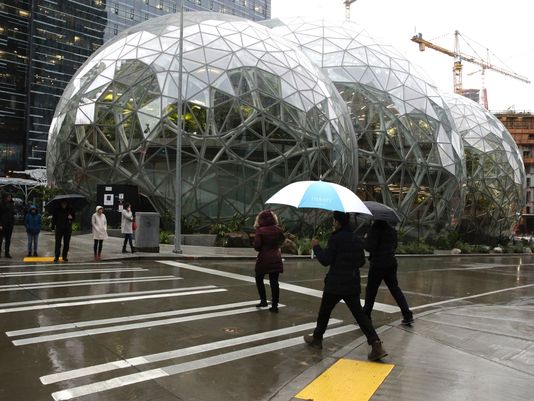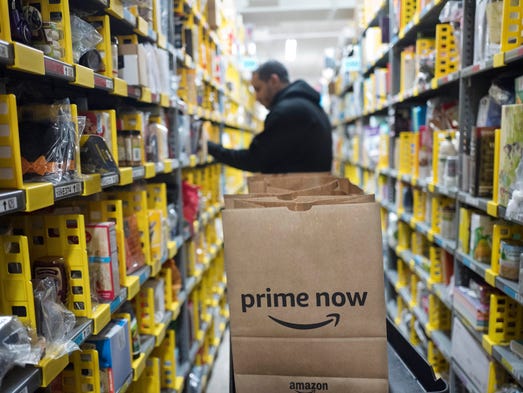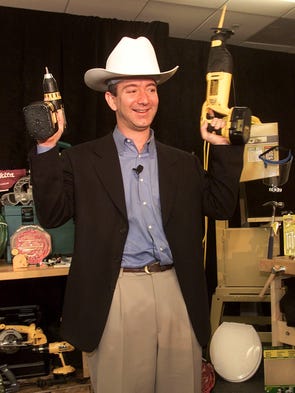(Photo: Jason Redmond, AFP/Getty Images)
SAN FRANCISCO — The finish line is in sight. Amazon has completed the visits it’s been making to the 20 cities winnowed from the initial 238 that wanted to be home to the Seattle company’s second headquarters.
Cities are eager to get on to the winning and the enormous financial windfall the prize will bring. But expect more hurdles before the race is over, say observers.
One and perhaps even two more rounds of finalists are likely, said Greg LeRoy, executive director of Good Jobs First, a Washington D.C.-based nonprofit that promotes economic accountability in development deals. There’s simply too much leverage to be gained from wringing more incentives out of the next rung for Amazon to immediately announce a winner.
Amazon used “incentive” 21 times in its original request for proposals in September 2017, notes LeRoy, indicating it’s likely to push for even better tax breaks and economic incentives from the finalists. And when Amazon announced in January the 20 cities it had chosen for more intensive looks, it called them “candidates,” not “finalists.
Amazon would not comment on the prospects of a second round.
The stakes are enormous. Amazon says will bring 50,000 high-tech jobs and spend $5 billion on construction to the second headquarters. Dubbed ‘HQ2’, it will be the “full equal” to its original Seattle home.
Those new Amazon employees will in turn create as many as 250,000 indirect jobs, according to the calculations of Enrico Moretti, an economics professor at the University of California-Berkeley.
The top five + one
So far the three Washington D.C.-area spots, along with Austin, Boston and Atlanta, rank high among analysts speculating on the winners. Canada’s Toronto is the wildcard.
Oddsmakers have been having a field day with the HQ2 placement. British online betting site Pinnacle put Northern Virginia first, at 3 in 100, followed by Austin, Boston, D.C. and Atlanta.
Irish bookie site PaddyPower had Boston on top, at 3 to 1, followed by Austin, Atlanta, Montgomery Co., Maryland and Pittsburgh. Canada’s Bovada betting site puts northern Virginia first, followed by Austin, Boston, D.C. and Atlanta, with Toronto gaining in popularity.
Being near the federal government might be strategic, especially with President Trump in attack-mode against Amazon. He has tweeted multiple times that the company doesn’t pay its fair share of taxes and is underpaying for shipping with the U.S. Postal Service, an arrangement he’s called a “scam.”
Trump has also been railing against the Washington Post, which Amazon CEO Jeff Bezos owns.
D.C. also looms large because Bezos is in the process of remodeling two linked mansions in the tony Kalorama district. The 27,000 square foot property, formerly a museum, includes a residence for Bezos’ family and the adjoining Wood house for entertaining.
Amazon is already hiring near the nation’s capital — and Boston. The Conference Board, an economic think tank, analyzed job postings in the 20 metro area candidates and found that in terms of the kinds of jobs Amazon hires for in Seattle, the D.C. area and Boston were the fastest growing in terms of Amazon technical staffers.
Being in those cities “makes it easier because they already have a core group of workers that wouldn’t have to relocate,” said Gad Levanon, chief economist for The Conference Board.
Many lump the three Greater Washington candidates — the District itself, Northern Virginia and Montgomery Co., Md. — together. But they are different in some ways. One is that while D.C. and Maryland have laws in place protecting gay rights, Virginia does not.
Amazon has long been a supporter of the lesbian and gay community, with Bezos, for example, donating $2.5 million to the 2012 campaign to legalize gay marriage there.
That could ding the northern Virginia bid. Gay rights advocates have been running aNo Gay? No Way! campaign to keep Amazon from choosing an area without protections for its employees and their families.
Amazon’s request for proposals doesn’t mention the LGBTQ community, but does include a section saying it requires “a compatible cultural and community environment” that includes “the presence and support of a diverse population.”
Boston gets the nod because of its deep pool of technical talent as well as excellent MBA programs, drawing from a broad array of colleges and universities in the region.
Two Texas towns, Dallas and Austin, made the top twenty. But Dallas is seen as sprawling, with bad traffic (a clear no-no in Amazon’s list of must-haves) and a very different cultural vibe than what Amazon currently has.
“If you wanted to be in Texas, a city like Austin, that has Whole Foods, a thriving tech and arts scene and a creative environment, would seem a better fit,” said Jeff Shulman, a professor of marketing at the University of Washington in Seattle.
Atlanta is in the mix both because of its strong regional ties, good universities and overall business friendliness. It’s also in the south and would pull in talent from an area that’s often overlooked by tech firms, said Marc Morial, president and CEO of the National Urban League, a civil rights organization.
The Canadian conundrum
Toronto, the only non-U.S. city on the list, is an outlier with some significant pluses but also drawbacks, both related to President Trump’s policies and pronouncements.
On the one hand, the United States’ increasingly hard stance on immigration is making it tougher for companies to bring in top talent from around the world. Locating in Toronto would side-step those problems. Canada’s immigration policies are very welcoming for highly educated individuals, which could help Amazon recruit global talent without running into U.S. professional visa restrictions.
Oddsmaker Bovada recently moved Toronto’s odds from 20 to 1 to 5 to 1 because of the immigration issue, said Pat Morrow, the head oddsmaker for the company.
On the other, locating in Toronto could be seen as an attack on Trump, who has made increasing U.S. jobs — especially those that had been moved to other countries — a cornerstone of his platform.
Choose disruption
In the end, while Amazon is a master at applying algorithms and data to problems, many major decisions at the company have come down to CEO Bezos’ gut feeling. He championed its popular Kindle e-reader when others in the company thought it was crazy and early on pushed for the Prime membership program even though he knew it would lose the company millions in the beginning.
The Urban League’s Morial thinks if Amazon really wants to rock the world, it should pick Newark, N.J..
It has large African-American and Latino populations, it’s right next to New York City and it’s a place where Amazon could be a real game-changer,” he said.
“In making this decision,” said Morial, “Amazon could be a leader in corporate America.”



